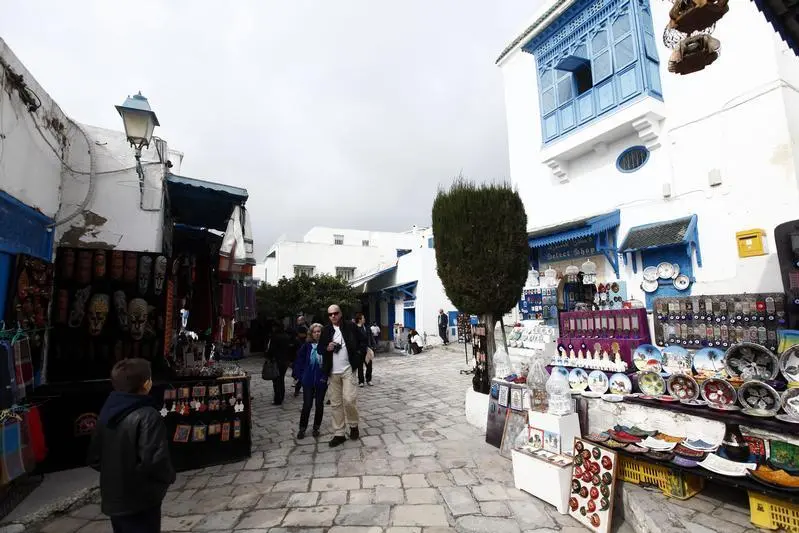PHOTO
DUBAI, Aug 4 (Reuters) - Tunisia's foreign currency reserves have dropped only marginally since the June 26 militant attack that killed 39 people at a seaside resort and severely damaged the tourism industry, central bank data showed on Tuesday.
The figures suggest authorities are succeeding in preventing the decline in tourism earnings from threatening any balance of payments crisis, even though the country runs a substantial current account deficit.
Net assets in foreign currency totalled 13.36 billion dinars ($6.78 billion) at the end of July, equivalent to 115 days of Tunisia's imports, compared to 13.50 billion dinars or 117 days in mid-June.
Tourist arrivals to Tunisia between July 1 and 10 plunged 58 percent from a year earlier, and were down 75 percent from the same period of 2010, the Tunis Afrique Presse agency quoted tourism ministry data as showing.
At the end of last month, the government cut its 2015 economic growth forecast to just 0.5 percent from 1 percent, citing the damage to tourism.
In a late July statement, the central bank encouraged commercial banks to extend the maturities of their loans to the tourism sector, to give them time to ride out the slump.
However, foreign reserves remain well above the level of 100 days of import cover which is widely considered a comfortable minimum, and above the 93 days hit in April 2014, which the central bank governor described as "dangerous".
The central bank did not say how it had prevented a significant fall in reserves during July, but the country periodically receives inflows of funds in the form of foreign aid from governments and multilateral donors.
In mid-July, the World Bank agreed to lend Tunisia $230 million to build roads; in May, the International Monetary Fund agreed to extend a $1.75 billion stand-by loan arrangement by seven months to the end of 2015. Some $1.15 billion of the total had been disbursed.
The central bank traded 735 million dinars in the foreign exchange market during July, slightly less than its monthly average this year, suggesting it has not needed to intervene heavily to keep the dinar (Reporting by Andrew Torchia; Editing by Tom Heneghan) ((andrew.torchia@thomsonreuters.com; +9715 6681 7277; Reuters Messaging: andrew.torchia.thomsonreuters.com@reuters.net))
The figures suggest authorities are succeeding in preventing the decline in tourism earnings from threatening any balance of payments crisis, even though the country runs a substantial current account deficit.
Net assets in foreign currency totalled 13.36 billion dinars ($6.78 billion) at the end of July, equivalent to 115 days of Tunisia's imports, compared to 13.50 billion dinars or 117 days in mid-June.
Tourist arrivals to Tunisia between July 1 and 10 plunged 58 percent from a year earlier, and were down 75 percent from the same period of 2010, the Tunis Afrique Presse agency quoted tourism ministry data as showing.
At the end of last month, the government cut its 2015 economic growth forecast to just 0.5 percent from 1 percent, citing the damage to tourism.
In a late July statement, the central bank encouraged commercial banks to extend the maturities of their loans to the tourism sector, to give them time to ride out the slump.
However, foreign reserves remain well above the level of 100 days of import cover which is widely considered a comfortable minimum, and above the 93 days hit in April 2014, which the central bank governor described as "dangerous".
The central bank did not say how it had prevented a significant fall in reserves during July, but the country periodically receives inflows of funds in the form of foreign aid from governments and multilateral donors.
In mid-July, the World Bank agreed to lend Tunisia $230 million to build roads; in May, the International Monetary Fund agreed to extend a $1.75 billion stand-by loan arrangement by seven months to the end of 2015. Some $1.15 billion of the total had been disbursed.
The central bank traded 735 million dinars in the foreign exchange market during July, slightly less than its monthly average this year, suggesting it has not needed to intervene heavily to keep the dinar (Reporting by Andrew Torchia; Editing by Tom Heneghan) ((andrew.torchia@thomsonreuters.com; +9715 6681 7277; Reuters Messaging: andrew.torchia.thomsonreuters.com@reuters.net))





















